In 2019, I was lucky enough to happen upon several really, really good books. And this month I decided to revisit an idea from January 2017 and tell you all about my favorite books from the past year.
I also started a new challenge in 2019. You know those “100 books to read before you die” lists that pop up from time to time, full of classics from world literature? This summer I stumbled upon yet another one and, as always, felt frustrated that I’d read relatively few of them. So I decided to correct this and made my own “bucket” list of 250 titles using the recommendations from this site, which offers a list generated from 128 best books lists. I went with 250 books rather than just 100 because I’d already read some in the 100-250 range and figured expanding the list couldn’t hurt. So far, counting the ones I’d already read, I have 55 of the 250 under my belt. Finishing the entire list will be the work of many years, but chipping away at this challenge makes me feel accomplished. And of course, I may just discover favorite new books and authors this way.
I also copied down The Guardian’s list of the 100 best novels written in English to be sure not to neglect any of those (I’ve read 25 so far), although there’s a lot of overlap between the two lists. And finally, I’m still working on my Read the World challenge with the goal of eventually reading at least one novel (any novel) from every country. So far, I’ve covered only 32 of the 196, but it’s a start.
So which of the books that I read in 2019 did I like the most? Read on to find out.
Heaven and Hell (2007) by Jón Kalman Stefánsson
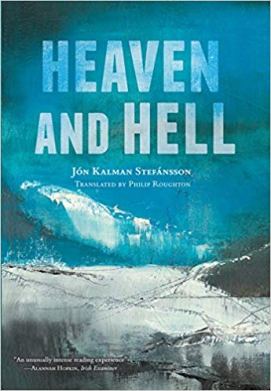 Of all the novels I’ve ever stumbled upon randomly, I think this one is my most valuable find. I was on my way home from a grocery store when I noticed a pile of abandoned books on a ledge and couldn’t resist stopping to check them out in spite of the surplus I already had at home. Seeing one by an Icelandic author (and being a big fan of Iceland), I decided to take it. It wasn’t long before I realized how lucky I was it had crossed my path. Heaven and Hell is about a young fisherman in a remote part of Iceland 100 years ago. As his real passion is not fish but words, he is sadly ill-suited to his job. Soon enough, tragedy strikes, prompting him to leave the crew to fulfill a special mission.
Of all the novels I’ve ever stumbled upon randomly, I think this one is my most valuable find. I was on my way home from a grocery store when I noticed a pile of abandoned books on a ledge and couldn’t resist stopping to check them out in spite of the surplus I already had at home. Seeing one by an Icelandic author (and being a big fan of Iceland), I decided to take it. It wasn’t long before I realized how lucky I was it had crossed my path. Heaven and Hell is about a young fisherman in a remote part of Iceland 100 years ago. As his real passion is not fish but words, he is sadly ill-suited to his job. Soon enough, tragedy strikes, prompting him to leave the crew to fulfill a special mission.
This story immerses you not just in another world and another time, but in a special realm of magic where you hear the thoughts of fish sighing in the depths of the fjords, peer into the labyrinth of the human soul and learn that you can hear the stars sing if you only climb high enough into the mountains. Narrative – and opinions – from a chorus of unidentified dead fisherman sometimes finds its way between the chapters. Although the novel is actually the first in a trilogy, it can also stand fairly well on its own. And if you become captivated by these characters, as I did, you’ll be glad there’s more to come. As I type these words, I’m halfway through the third volume, The Heart of Man, and am loving it.
The copy of Heaven and Hell that I happened upon is the French translation (Entre ciel et terre) by Éric Boury, whom I greatly respect as his version seems to have touched the hearts of this readership just as effectively as the original has with the author’s compatriots. And as the English version by Philip Roughton also has stellar reviews, I will not hesitate to recommend both here.
Madame Bovary (1856) by Gustave Flaubert
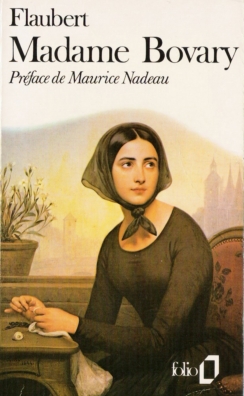
If it hadn’t been for that “best books” challenge, I probably wouldn’t have picked this one up for a while. But it was more enjoyable than I expected, and I now regret waiting so long to read anything by Flaubert. Essentially a parable about the perils of ambition, Madame Bovary makes its points through the sad tale of the anti-heroine and also some minor characters.
Perpetually dissatisfied, Emma Bovary has made the mistake of marrying a boring country doctor and they live decidedly too far away from the excitements of cities and society life for her liking. Although this story was written in the 19th century, its moral is still highly relevant today and, human nature being what it is, will probably remain so.
I read this novel in the original French on Kindle (hooray for the public domain!) and as a side benefit, learned the French names of obsolete objects such as the buvard (ink blotting paper) Emma uses when penning her many letters to a certain rascally someone – you’ll have to read it yourself to find out who!
After finishing the book, I was excited to find a recent English-language film adaptation by Sophie Barthes, starring Mia Wasikowska, on Netflix. Sadly, it proved highly forgettable, and I couldn’t get past the fact that some actors spoke with British accents while others had American ones, and all the characters were of course all supposed to be from the same country (just pick one accent!).
Song of Solomon (1977) by Toni Morrison
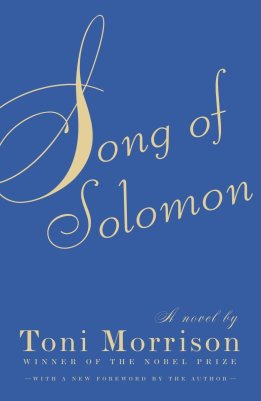
This novel was in the “best book” list too, but I would have read it anyway as I love Toni Morrison (who sadly left us this past year). During a visit home this summer, I found a copy of it in my mom’s bookshelf and dove in.
Song of Solomon follows the story of the oddly named Milkman Dead and his even odder family. As he comes of age and tries to make his way in the world, he discovers secrets about his mother and father that drive him on a quest to learn more.
The story, which draws in part upon African-American mythology, seems at first to meander, introducing various eccentric characters that don’t seem to have much to connect them. But as you read on, you piece together the rich tapestry of their shared history and destinies that intertwine no matter how hard the people try to keep their distance. As always, Morrison’s beautiful prose shone and I had trouble putting the book down. The copy I read was from the 80s and its cover informed me it had been named the best book of 1977. It’s easy to see why!
Blond(e) Boy, Red Lipstick (2018) by Geoff Bunn
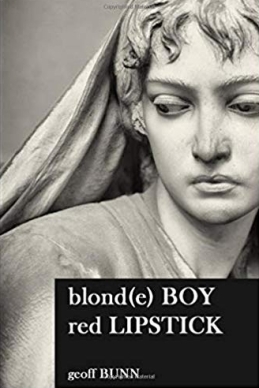
This one came to my attention through the recommendation of a translator friend with good taste in literature.
Set in London and Birmingham in the 1980s, Blond(e) Boy, Red Lipstick is a transgender romance, the first I’ve ever read. I was intrigued to find out how the main character, a young heterosexual man, ends up falling in love with a girl who turns out to be a boy. But the main thing that comes through in this story is the universality of human emotions. No matter who you are, and who you love, you’ll recognize the feelings the unnamed protagonist experiences.
And perhaps also those small points in time where, Sliding Doors style, a choice can change your whole future. The times, too, when life seems inexplicably to pave a way for you along a certain path. As the protagonist observes, “There are moments in life that are given to us.” On a side note, I can easily imagine this as a film, with an early 80s aesthetic and a great soundtrack!
Life after Life (2013) by Kate Atkinson
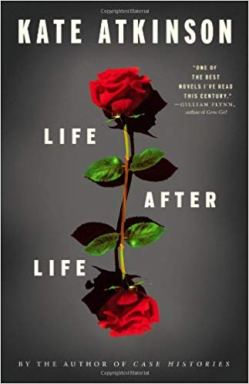
What if you could live again and again, until you got it right? Such is the premise of Life after Life, an exceptional story, which follows Ursula Todd through a myriad of attempts at life. Tragedies occur, mistakes are made, and she dies at various points in her existence. Each time, she is born again as the same person, to the same family, under (roughly) the same circumstances, and repeats the same life. When she reaches the moment that saw her die the last time, she instinctively avoids the situation or takes a different action that leads to her going on living.
Watching her do this, you come to realize the enormous impact one small choice, one resolute decision, one failure to act can have. It made me reflect upon many times in my past when I should have done something different. How would things be now if I had? It also reminds you that a chain of events lies behind anyone’s situation in life, bad or good.
Another thought that may strike the reader… what if this were how life actually works? Could it be the explanation for déjà vu? We can’t prove it either way, but what would you change if you were going to live your life over again?
Homegoing (2017) by Yaa Gyasi
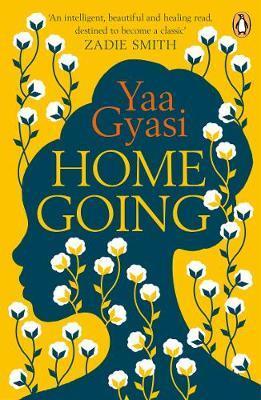 This novel was another somewhat random find. I was at one of my favorite libraries, browsing through its fairly extensive foreign-books section (this is why it’s a favorite library), and it was propped up on a display stand. I’d never heard of the author, but the endorsement by Zadie Smith was enough for me. Homegoing was a fortuitous find, for this is a gem of a book.
This novel was another somewhat random find. I was at one of my favorite libraries, browsing through its fairly extensive foreign-books section (this is why it’s a favorite library), and it was propped up on a display stand. I’d never heard of the author, but the endorsement by Zadie Smith was enough for me. Homegoing was a fortuitous find, for this is a gem of a book.
The story begins in 18th century Ghana, with two half-sisters who are each unaware of the other’s existence. The choices they make – or that are made for them – take them down very different paths. Effia becomes an English slave trader’s bride and lives with him in a castle while Esi is enslaved and sent to work at a plantation in the American south.
The story follows the descendants of each sister, their fates inescapably linked to that original diverging point, up to the present day. Each chapter is one person’s story. We see what life was like over the centuries in Ghana and also how Esi’s children and grandchildren fared under slavery and then in a country marked by slavery’s heavy legacy.
Informative and beautifully written, this novel is all the more impressive for being the author’s debut novel. My only complaint was that I wanted it to be longer!
All the Light We Cannot See (2014) by Anthony Doerr
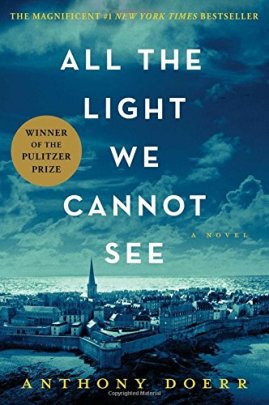
I found this novel at the same library, but it had been recommended to me by a few people. All the Light We Cannot See is the touching story of a blind French girl and an orphaned German boy whose fates intersect during World War II. The girl flees with her father from Paris to the walled city of Saint-Malo, where they try to survive alongside an eccentric uncle and scheming neighbors. The boy, meanwhile, becomes a Nazi soldier through no particular decision of his own and takes some time to make up his own mind about what it is that he’s participating in.
With sight and the invisible as a theme, the novel focuses among other things on the various ways people react to crisis, making choices that protect their own interests but hurt others or, inversely, help others but cause their own downfall or even demise. The consequences, of course, are often invisible at the time of choosing.
Swing Time (2016) by Zadie Smith
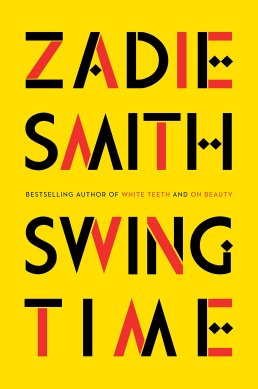
As the title suggests, dance and performance is a major theme of this story, which revolves around the complicated friendship of two girls growing up in a low-income neighborhood of northwest London. One has talent but faces obstacles, while the other has dreams without the corresponding skills and eventually finds herself taking another path.
The part of the novel set in Africa is what interested me most. A mega-rich, mega-popular American pop star decides to open a school for girls in an underprivileged rural area of an unnamed African country. But when the best of intentions, cultural ignorance and too much money coincide, things don’t always go as planned.
The various storylines in this novel can sometimes feel disconnected and disjointed, but isn’t that kind of how real life works too? I found this novel very entertaining in spite of it all.
Honorable mentions
Here are a few more that I read in 2019, but that I don’t recommend unreservedly.
Orlando (1928) by Virginia Woolf. Although I enjoy Woolf’s writing overall, her stream-of-consciousness style can make getting through her books somewhat of an arduous task. But Orlando is an important work in the history of literature, both for feminism and transgender topics (it is the first English-language trans novel). In this novel, which spans three centuries and relies on a good dose of magical realism, the titular protagonist has adventures in several countries and undergoes a spontaneous sex change midway through. Woolf’s friend and lover Vita Sackville-West was the direct inspiration for the character, so reading this novel is a good way to gain a better understanding of both authors and their writing. But reading Orlando is not a thankless task – it does demand work on the reader’s end but there are many rewards along the way, moments of pure comedy and biting insights into patriarchy’s various unfairnesses. Watching Sally Potter’s beautiful 1993 film adaptation (starring Tilda Swinton and a cross-dressing Quentin Crisp) could be a good way to get started on this book, which does however have a lot more content than what could be covered in the film.
At the Strangers’ Gate (2017) by Adam Gopnik. This memoir of the author’s early days in New York City was one of my Paris sidewalk finds, and since I knew his name already from his Paris book (which I haven’t read yet), I took a chance on it. Alas, there’s a certain tediousness in his style. I can’t quite put my finger on what’s wrong, since he’s clearly a skilled writer, but it may have something to do with his love of aphorism. Or maybe you have to be more interested in his life and the celebrity friends he talks about. Still, I enjoyed two chapters of At the Strangers’ Gate and recommend them to anyone who writes for a living (copywriters, editors, translators). The first one is chapter 6, “The Simple Logic of Summer Shirts,” in which Gopnik recounts his time working as a fashion copyeditor for the magazine GQ in the 80s: “The rhetoric of fashion – even men’s fashion – in those days, as probably in these days, too, depended on a simple, puzzlingly repeated tale of previous confusion from which we had now blessedly – just this month! – recovered.” I recognized this rhetoric, which is definitely still a thing, from my fairly limited experience translating for fashion brands. And in chapter 9, “Writing,” he talks about his work for a publisher, offering up more tidbits on publishing that could be useful or interesting to the categories of people I mentioned above. And who knows, maybe you’ll like the rest of the book more than I did.
Can’t and Won’t (2017) by Lydia Davis. The first work in the genre of flash fiction that I’ve ever read, Can’t and Won’t was full of fun little gems, pithy observations on everyday life that anyone can probably relate to. Some were very very short, consisting of just one sentence, like “Sitting with My Little Friend” (“Sitting with my little friend on the front/step:/I am reading a book by Blanchot/and she is licking her leg.”). Other longer ones offered a dry humor that I appreciated – like when the author and her neighbor both become paralyzed with indecision over a throw rug, or when the author receives a box of chocolates and cannot decide who should eat them and when. My favorite piece was a letter the author purportedly sent to a green pea manufacturer to complain about the package images and suggest improvements (it’s the kind of letter I often contemplate writing when I encounter bad translations on packaging or restaurant menus, but never do). Davis happens to also be a French to English translator, like myself, and has produced new translations of some of Flaubert’s work (after reading the original Madame Bovary this year, I now want to check out her version). And this collection of stories includes some rather experimental pieces drawn in part from Flaubert’s correspondence. But they aren’t straightforward translations – rather, she starts with one of his letters but sometimes embellishes upon it or combines it with something from another of his letters. The result is generally an amusing anecdote, although it is a bit frustrating to not know how much of it is Flaubert and how much Davis. In any case, although I enjoyed this book I didn’t include it in my main list of recommendations because flash fiction is a genre with many detractors (especially judging from the Goodreads comments), so this type of writing may not be for everyone.
How about you? What good books did you read this past year? What are your favorites of all time? Let us know in the comments.
In any case, I hope some of my favorite reads will inspire you too. And for more ideas, be sure to also check out my best reads list from 2016. Happy reading, fellow bookworms!





The Zadie Smith book has been on my list for ages.
LikeLiked by 1 person